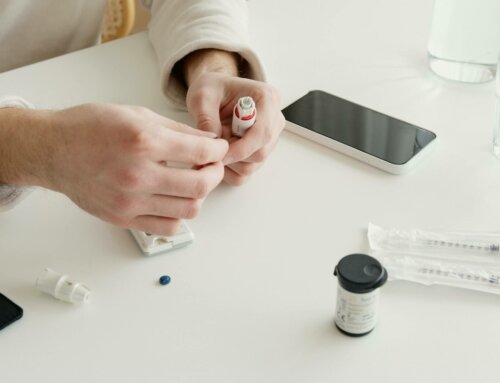In this article we will review the following five reasons someone with diabetes may experience excessive sweating.
- Blood glucose levels
- Hyperthyroidism
- Heart Problems
- Outdoor Heat
- Stress
Whether you are sitting in a stuffy room, working in the garden or working out at the gym, excessive sweating can be noticeably uncomfortable. People with diabetes can be prone to excessive sweating, which can also lead to dehydration and other health complications. Discover 5 reasons for heavy sweating with diabetes and what you can do about them. Understand that heavy sweating can also signal poor diabetes control.
1. Blood Glucose Levels
Excessive sweating in diabetes can be linked to low blood glucose levels known as hypoglycemia. When blood glucose levels plummet, it triggers a “fight or flight” response from your body. As a result, your body produces additional hormones known as norepinephrine and adrenaline. This can lead to symptoms of hypoglycemia such as heavy sweating, shakiness, hunger, stomach cramping, blurred vision, fast heartbeat, headaches, nausea, weakness, confusion, anxiety and tingling around the mouth and lips. If low blood sugar or hypoglycemia is ignored, it could lead to coma and even death. Causes of hypoglycemia can vary from too much diabetes medication such as sulfonylurea pills or insulin, too much exercise or not eating enough carbohydrates. It is important to get your blood sugar back to normal as soon as possible to alleviate these symptoms including sweating. Keep glucose tablets, a few pieces of hard candy or a can of regular soda handy to increase your blood sugar levels quickly.
It is best to use the “Rule of 15” which is suggested by the ADA (American Diabetes Association). Although individual targets may vary, a level of 70mg/dl or below should be treated as hypoglycemia. Eat 15 grams of a simple carbohydrate like 3-4 glucose tablets to be chewed, wait 15 minutes and recheck your blood glucose level. If it is still below 80mg/dl, retreat with 15 grams of simple carbohydrate. Follow this with a small snack of 15 grams of a carbohydrate such as 1-2 whole grain crackers plus a small amount of protein like a slice of cheese or a tablespoon of peanut butter if you are not planning to eat a meal within 30 minutes. Try to maintain better blood sugar control by taking medications and insulin as directed, eating regular meals and snacks and exercising daily. Use a blood sugar monitor to gauge your glucose levels.
2. Hyperthyroidism
Another reason for heavy sweating is hyperthyroidism, a metabolic condition that people with diabetes may be prone to as 10% of people with diabetes will develop a thyroid disorder in their lifetime. Hyperthyroidism can affect any age group but is much more common in women. Thyroid hormones have an affect on almost every system of your body. The thyroid gland plays an important role in maintaining insulin levels and blood glucose levels. The thyroid gland, found in the front of your neck, produces key hormones in response to signals sent by your brain. These hormones work to increase or decrease your metabolic rate. When the thyroid gland is overactive, it is referred to as hyperthyroidism. More hormones are secreted than usual, which boosts your metabolic rate. This can cause heavy sweating, heat sensitivity, neck swelling, weight loss, hair loss, fragile nails, heart palpitations, dry eyes, tremors, irritability, increased appetite, insomnia, frequent bowel movements, shaking hands, and nervousness. Some people might also have difficulty breathing or swallowing. In young women, hyperthyroidism can cause irregular periods, miscarriages and infertility. Excessive thyroid hormones can cause increased glucose produced in the liver and insulin resistance leading to poorly controlled diabetes. People with diabetes should be periodically checked for thyroid disease with a simple blood test. Treatments may include medication, radioactive iodine and in advanced cases, surgery. The combination of diabetes and hyperthyroidism can worsen diabetes symptoms and lead to further complications especially neuropathy or nerve damage. Hyperthyroidism also plays a role in bone loss or osteoporosis. Neuropathy can lead to foot numbness, a decrease in proprioception (where to place feet) and an increase in falls causing bone fractures. It is important to seek treatment immediately, especially with diabetes to decrease these problems.
3. Heart Problems

- Sweating
- Hot flashes
- Shortness of breath
- Jaw, shoulder, back or arm pain
- Chest pain, squeezing sensation, tightness, fullness, heaviness or pressure
- Men and women may have different symptoms
Act immediately by calling 911. Talk to your physician about lowering your chance of heart disease when you have diabetes by exercising, quitting smoking, eating a healthy diet, reducing stress and possibly taking medications.
Manage your ABCs:
- lower your A1C level
- get control of your Blood pressure
- lower your bad LDL Cholesterol.
- Outdoor Heat
4. Outdoor Heat
Outdoor heat, haze and humidity while exercising can be difficult on the heart and cause excessive sweating. Older people, people with chronic diseases such as diabetes or heart disease may have a dulled response to dehydration and may suffer from heat stroke faster and more often. Sweating helps the body cool down by dropping the body temperature through evaporation. When the humidity is 75% or higher, it is difficult to cool down by sweating since there is too much water vapor in the air. Sweating is hard on the system because it pulls out sodium, potassium and other minerals needed for nerve conduction, water balance and muscle contraction. Sweating also increases blood flow to the skin when you are over-heated. Stay in an air-conditioned environment such as a gym, a yoga class or community center when exercising in the summer heat and humidity. Find a shady spot if you choose to stay outdoors. Use an indoor pool or one that is covered by shade. Stay inside from 10AM-4PM when you do decide to exercise outdoors. Go to an air-conditioned movie or indoor mall mid-day. Eat light meals, do not turn on the oven and try to drink a few ounces of cool water every hour. Consult with your doctor about how and when to exercise. Never push yourself to the point of fatigue or heavy sweating which could possibly lead to heat stroke.
Symptoms of heat stroke include:
- Confusion
- Muscle twitching
- Nausea and vomiting
- Headaches
- Reduced or no sweating at all
- Stress
5. Stress
Another reason for heavy sweating is emotional or physical stress. The stress response occurs when the body perceives a threat. A hormone called adrenalin floods the body and increases the heart rate, blood pressure, breathing rate, blood sugar and perspiration. Sweat comes from the sweat glands which are mainly located in the armpits and groin. Many people also sweat heavily on their feet and palms of their hands. It is a normal response when you are anxious about anything, ranging from a job interview, a near accident, to a first date. Wear natural, breathable fibers like cotton, avoid spicy foods, lose weight, avoid nicotine, caffeine and alcohol to reduce sweating. Take several deep breaths when you start to sweat. Utilize progressive muscle relaxation by tensing and relaxing all muscle groups, write in a daily journal, listen to relaxing music, carry a change of clothing and if all else fails, consider a support group or therapist to help deal with your stress. Use an antiperspirant to minimize perspiration under your arms. Apply Gold Bond powder to the crevices of your body that might get sweaty, such as under your breasts and stomach. Use on your feet including between the toes to reduce the risk of fungus from the heavy sweating. Drink water to stay hydrated.
If you experience heavy sweating, you are not alone. Take measures to make yourself comfortable when you sweat. If you continue to suffer from excessive sweating, consult with your health care team to find out the reasons why and how to treat them.
Have a question or comment? Then post below, no registration required. I would love to hear from you!
NOTE: Consult your Doctor first to make sure my recommendations fit your special health needs.







I am using Nightrider BluCon for the past 8 months, and the device has provided me the best way to manage my diabetic issues. I am using the device with my Libre 2 Sensors, and it transmits the readings directly to the LinkBluCon on my phone every five minutes. It is the best device that I have ever used, and recommend it to any person having diabetes.
I have excessive sweating when my blood sugar is too high it seems. My face is always very red and flushed looking and I sweat on the back of my neck and my forehead , in the bend of my arms, inside my thighs and peri area.
I am miserable at work.
Do you know anything about this ?
Hi there. There are over 8 million people in the US effected by excess perspiration. Excess perspiring can impact you psychologically and cause an increased risk of nail infections, warts, bacterial infections and heat rash.The best thing to help avoid excessive sweating is proper blood glucose management. Generally excessive sweating ,known as hyperhidrosis, is from low blood sugar or hypoglycemia ,not high blood sugar. First, you must check your blood sugar and see if it is 70mg/dl or below, or if you feel symptoms of low blood sugar including headaches, sweating, shakiness ,anxiety . Low blood sugar causes the body’s “fight or flight response” to occur since your body is under stress. Your body will trigger a hormone- adrenalin that causes the excessive sweating. If you do suffer from low blood sugars you should always eat meals on time, never skip a meal, never go longer than 4-5 hours between meals and always be prepared with a snack. You should have glucose tablets available and chew 15 grams-usually 3-4 tablets, wait 15 minutes and retest. If your blood sugar remains low or if you still have symptoms then retreat. Nerve ending problems can also cause excessive sweating. The sweat glands can become over-whelmed and damaged and stay “on” or remain in “active mode”. Make sure your excessive sweating is not due to thyroid function, obesity, menopause or infections. Generally, high blood sugar makes you tired, hungry ,thirsty or need to urinate often. Please check with your health care provider to diagnose the actual cause. When you know the cause ,you can treat with prescription antiperspirants, Botox or antidepressants. You should wear natural fabrics in clothing ,socks and shoes. Keep a small fan on your desk and sip cool water thru out the day. I hope this answers your question. Best of luck,
Nurse Robbie
When it comes to excessive sweating, you don’t want to just use a powder for your stress sweating or any related with excessive sweating. While many websites tell you that baby powder is the way to go for excessive sweat, I rather use a product that doesn’t have any talc in it.. Like Lady Anti Monkey Butt. I use that for all of the areas where a antiperspirant wouldn’t work. But if you are talking about your armpits, you never should use a ANY type of powder there. What you need for that extremely sweating area is a prescription deodorant that contains aluminum. Aluminum is really the only thing that would control the constant sweating. IF you are having a problem with sweating than you need to look for a product that specially designed for it. Certain Dri has been something that all doctors recommend because is has Aluminium Chloride in their most popular product. Their prescription strength product a low dosage of aluminum that still give excellent coverage. I highly recommend it for people that don’t have a solution for hyperhidrosis because the concentrate is so low (12%) that its nearly impossible for it not to work. Good luck and I wish you all the best.
What to use to stop sweating all over your face and neck where powder would show